- Home
- Christie Golden
The Enemy Within Page 2
The Enemy Within Read online
Page 2
Ivaar looked miserable. He hunched down on his brown mare. “It’s just not that simple.…” he began wretchedly.
Tristan snorted in disgust and kicked Kal with unusual force. Startled, the beast leapt forward. Ivaar watched him enter the barbican. A few moments later, all the pennants were lowered to half-staff.
Tristan wasn’t an evil man, and Ivaar knew it. But, the young man thought to himself as headed toward Kantora, Tristan had given in to habit. Monarchy was right simply because that’s the way things had always been. Perhaps the Calpranian Council of Twelve had its problems, but they could be worked out. Ivaar and more than a few other young nobles of the land thought so. And even if the Twelve were of noble blood, surely that was better than one man having the kind of power Nova Vaasa granted to its kings. Kingship, thought Ivaar bitterly, is an accident of birth. Nova Vaasa was damned lucky that Kethmaar had been the kind of ruler he was. Ivaar had met Othmar and strongly doubted he would make a good leader.
Ivaar’s lips twisted in an ironic smile. Perhaps Othmar’s incompetence would turn others toward Ivaar’s way of thinking.
A fork of lightning split the sky, and Ivaar winced at the loud crack of thunder. The heavy clouds opened, disgorging their contents. Within seconds Ivaar was soaked. His father had been right.
Still clad in the long cotton shirt that served him as a sleeping garment, Tristan opened the shutters of the large window in his bedchamber and took a deep breath. The window was sheltered from the direct pounding of the rain, and he extended a hand to catch the cold wetness. The day of Kethmaar’s funeral would be a fittingly somber one. The brisk, chilly breeze that stung Tristan’s eyes and brought color to his pale cheeks also turned the plains into a rippling ocean of rain-sodden grass. The knight sighed and closed the window, drying his hand on his shirt.
As he did every morning, Tristan slipped on a robe and tugged a rope near his bed to summon the maid. Using one of his “little magics,” as he called them, he lit his bedside candle with a single word and a wave of his hand. He then carried the glowing taper toward his writing desk, located beneath a large portrait of a beautiful young woman. He set the candle down on the desk, then sank into the cushioned chair beside it and sat for a moment, gazing up at the portrait.
His wife of seventeen years smiled down at him. The painter had captured Ailsa’s sweet smile, which made her beautiful green eyes even brighter. The rich mahogany of her hair was caught up and pinned atop her head, held in place with jeweled combs that, to Tristan, gleamed less brightly than his beloved’s eyes. Her slim neck was bare, but a rich brooch was pinned above her right breast to her heavy silk dress. Tristan had given the brooch to her the day she accepted his proposal, and she had worn it every day of her life since. Even now it adorned her as she slept peacefully in her grave. The painting also showed a small, tawny-hued cat sitting in his mistress’s lap. Ailsa’s slim hands reached to stroke it, caught forever in that gentle, affectionate pose.
A knock at the door startled Tristan out of his reverie. The sound also woke his dog Luath, who slept at the foot of his master’s bed. A mammoth creature with a surprisingly gentle disposition, Luath raised his big head and whuffed to alert his master. “I hear it, boy,” Tristan told the beast. To his visitor, he called, “Enter.”
Ten-year-old Madeleine Guillaume entered, curtsying. The girl was the daughter of Tristan’s chief servant, Giles Guillaume. She bore Tristan’s breakfast tray professionally; the china jostled not at all, and the pot of steaming hot water remained level. “Good morning, Sir Tristan,” she murmured. “Where would you like your tray, sir?”
“On the chest by the bed, my dear,” he answered. She glided smoothly over and deposited the tray.
“Will there be anything else, sir?”
“Nothing now, thank you. And tell your papa that I was very pleased with the way you delivered my breakfast this morning.”
She blushed and curtsied again. “Thank you, sir. Madame must be pleased, too.” She gestured shyly toward the portrait of Ailsa. “I found a flower on my pillow this morning.” Like a little ghost, she glided out and, with the barest of sounds, shut the door behind her. Madeleine will make the fifth generation of Guillaumes to serve the Hiregaards, Tristan thought to himself with pride. Obviously, the family is well content at Faerhaaven.
Her comment about “Madame” amused him. Ailsa’s gentleness had utterly won over the servants. There were rumors that her spirit still did kind things—made beds for busy maids, left flowers on pillows, and so forth. Tristan suspected Giles Guillaume of these tricks, meant to inspire good service. Whoever the prankster was, the jests were harmless, even endearing, and Tristan did not discourage the domestics from believing in the benevolent spirit of their mistress.
Tristan poured a cup of tea. Sipping cautiously at the steaming liquid, he regarded Ailsa for a few more moments.
“I wish the stories were true. It would be nice to think that somehow you were still here, still keeping an eye on us all.… But you’re not. Now Kethmaar comes to join you, my dear,” he said sadly to the woman on the wall. “First you, then Kethmaar. I have not many more left to lose these days. No friends save Osric and dear young Sigfrid. No kin save our boy, and Ivaar absolutely baffles me. I can’t even talk to him. He needed a mother, not a politician. Maybe you could have …” He sighed. “I try to see me in him, somewhere, to see you in him, but I can’t. All I see is a spoiled, ungrateful—”
He didn’t want to think about his disappointing son anymore. Setting his cup aside, he took a key from the pocket of his robe and unlocked a drawer. Inside were dozens of books—Tristan’s journals of bygone years. He removed the newest one, opened it, and placed it on the desk. As he seated himself, he lifted the quill from the inkwell and began to write.
Avarill 3rd: Today I bury my friend Kethmaar. I, along with four others, am a regent for the young prince Othmar. It will be my greatest challenge yet, I fear, making the business with the Vistani look like child’s play. But it is my duty, and I shall not shirk it, both for the love I bore Kethmaar and the love I bear my people. That doesn’t mean I have to like it.
Engrossed in his journal, he did not see Luath fasten his eyes on the emptiness behind Tristan. The candle flame flickered and began to burn blue.
The gods had long since become “unfashionable” in Nova Vaasa. A few country folk still worshiped various deities, but the majority of citizens had ceased to search for the sacred in their daily lives. There was little wonderment in the world to inspire awe and respect for some distant divinity. Nor were there many dangers in the land that would not fall to a solid sword blow or arrow. Traditional clerical duties had gradually become the responsibility of others. Herbalists healed without divine intervention; people learned to rely on themselves rather than favors from a divinity. Other responsibilities fell to the government, such as weddings and, less happily, funerals. As mayor of Kantora, it was Osric Laars’s duty to attend the king’s funeral; as friend of the dead man, it was his privilege.
Rain pattered in a dull drizzle. Tristan adjusted his cape, pulling the hood protectively over his eyes. Standing outside the city walls near the royal mausoleum, he listened with only half an ear to Laars’s eulogy. His attention had settled on Othmar.
Othmar wore no cloak, wanting his new subjects to get the best possible view of their new ruler. Rain, however, was no respecter of rank. His velvet doublet was now ruined and clung wetly to his slight frame. His leather belt had been stained magenta once; now it was a reddish brown, and most of the magenta had spread to the once-gorgeous velvet. The only tasteful thing the youth wore was his prince’s coronet, an understated circle of gold. That, and his mourning band of green.
Nearly everyone was wearing a green garment of some sort, and the color stood out like spring in the middle of winter. All manner of classes and ranks were represented here: the nobles, the very poor, the merchants. There were even a few dark Vistana faces to be seen.
Tristan had ar
rived two hours before the ceremony and had posted guards along the funeral route as it processed down High Road and East Street, and here at the interment site itself. Some of them were not in uniform, but disguised in the tattered rags of beggars or the sweat-stained garb of laborers. These guards would be able to sense the crowd’s mood and act upon it at once. Though Kethmaar was a well-respected monarch, Tristan recognized the possibility that some rabble-rousers might choose to disrupt the solemnities. As Tristan’s blue gaze scanned the crowd, he met the eyes of a handsome young man with a shock of red hair. Tristan smiled slightly. Captain Sigfrid Skolsson, second in rank only to Tristan, nodded briefly in acknowledgment. He, too, was alert and watchful.
Tristan relaxed slightly. Few knew it, but Sigfrid had once been on the other side of the law. In the boy’s wildness, though, Tristan had seen something worth pursuing. He had watched the youth grow from a horse thief into an utterly reliable soldier. There were those who had questioned Sigfrid’s rapid rise in the military, but Tristan had never found cause to regret smoothing the youth’s way. With both himself and Sigfrid alert to potential problems, little was likely to happen today.
Laars’s eulogy drew to a close. “We were glad to have Kethmaar among us, but it is time for him to lay down the burden. So he goes to his ancestors, with our thanks to echo his passage.”
Kethmaar lay on a bier, clad in his most ornate robes. His sword rested by his side. The king’s face was bare for all to see. No amount of cosmetic paint could hide the ravages of the illness that had claimed him, and he did not wear the look of peace that often graced the dead. Tristan stepped forward, ready to carry out his final duty to his liege.
Traditionally, the key to the resting place of the Nova Vaasan royalty was passed only from king to king. As Tristan was head regent, it had been entrusted to him. Now he drew it out, and it began to glow a cool blue. The lock was both physical and magical. One without the other was useless. Tristan spoke the correct word, and the lock clicked as the key turned. Servants stepped forward and pushed the gate open. It groaned in protest, but obeyed. Though the kings always bore much worth stealing to their final resting place, the crypts had never been desecrated by grave robbers. Legend had it that the spirits of the kings guarded their bodies. Tristan, however, thought that the magical lock and hungry plains cats had more to do with the crypt’s safety than spectral guardians.
Othmar moved to his father’s corpse. His face devoid of grief, the youth placed the traditional handful of rosemary leaves in Kethmaar’s dead hands. His job done, Othmar stepped back and motioned the pallbearers to proceed with their solemn burden. Accompanied by torch carriers, they marched through the gate and into the open doorway of the mausoleum. The flickering light of the torches was soon lost to the view of the spectators, swallowed by the cool darkness of this place of death. Several long moments passed, and the crowd fidgeted in uncomfortable silence.
Farewell, Kethmaar, Tristan thought.
The pallbearers emerged, looking slightly relieved. “It’s about time,” muttered Othmar. As quickly as he could, the prince retreated to where a servant held his horse. Tristan followed, as did the other members of the party. Some would have liked a few moments beside the grave, but they, like Tristan, must needs follow their prince.
The crowd parted for the young royal. Othmar’s black mare slogged through the mud until she reached the cobblestones of the road that led back into Kantora. They had almost reached the city gates when, without warning, the horse neighed abruptly and reared. Startled, Othmar struggled to keep his seat. One hand flailed as he sprawled comically in the saddle, and a few onlookers laughed. Tristan was instantly at his side, seizing the mare’s reins and looking about for the disturbance.
He found it. A young Vistana, a boy about the prince’s age, clutched a wriggling mongrel puppy protectively. He glared up at Othmar, a little frightened but yet defiant. He did not back away when Othmar, haughtily yanking his mare’s reins from Tristan’s grip, rode directly over to where the boy stood.
Tristan recognized the youth. He was Amasa, the son of Konstantin, one of the best Vistana horse tamers. The boy had gotten into trouble before, but never directly with an angry Prince Othmar. Before Tristan could speak, the indignant royal raised his riding crop and brought it slashing down across Amasa’s upturned face. A bloody welt arose on the dark skin, dangerously close to Amasa’s left eye. Othmar’s arm rose for a second blow, but it never fell.
Amasa snarled with outrage. His brown right hand shot up to grab Othmar’s arm. Still holding the now-frantic puppy, Amasa tugged with all his strength. The prince toppled off his mount, landing heavily on the slick cobblestones. The Vistana seized the prince’s crop and stood over Othmar, breathing heavily, ready to give as good as he had gotten.
Tristan and Konstantin were there before the blow could fall. The knight grabbed Othmar as the boy struggled to his feet. Konstantin slapped Amasa’s hand soundly, and the boy released the crop at once. His father’s strong but compassionate grip on his shoulder was all Amasa needed to restrain himself. Othmar jerked away from Tristan. The prince brushed off what dirt he could from his now utterly ruined clothing, then turned his attention upon Amasa.
Words of contrition would have done much to soften Othmar’s rage, for the prince was an easy mark for a flattering tongue. The Vistani, Tristan knew, were too arrogant for such gestures, and he was not surprised to see Amasa, still panting and holding the dog, meet Othmar’s gaze evenly and angrily.
“You have threatened the life of the prince,” Othmar declaimed. “Such an outrage is intolerable. I sentence you to death!”
The shocked crowd broke into excited, angry babbling. Konstantin’s brow darkened, but before he could speak Tristan said, “Your Highness, may I have a word?” Propelling the boy out of the Vistani’s earshot, he hissed, “You cannot simply order an execution for an insult!”
Othmar laughed without humor. “I can and I will!”
“Listen—just listen to me for one moment!” Something in Tristan’s tone commanded attention, and Othmar quieted. “The Vistani train the horses, and the horses are Nova Vaasa’s lifeblood. Kill this boy for such a minor offense, and you’ll alienate all Vistani. And if you alienate the Vistani, we all suffer.” He had the boy’s attention now and continued. “Make him give you a formal apology, or fine the family, but do not get their blood on your hands.”
Othmar’s hazel eyes searched Tristan’s, then he nodded slowly. Drawing himself up, he turned to Amasa and Konstantin. “Although I am well within my rights to demand your death, I am a merciful ruler. You may live. However, such an action cannot go unpunished. We hold the whole family of this boy responsible. On the suggestion of Sir Tristan Hiregaard, I hereby declare no one shall have dealings with this boy’s family for one full year.”
Tristan gasped, staring at Othmar. The punishment was ludicrously savage. Konstantin’s family wouldn’t starve; the Vistani protected their own. But neither would they be able to earn any money to invest in breeding and caring for new horses for the following year if Othmar forbade trade with them. Othmar noticed Tristan’s reaction, and he smiled a nasty little smile. He returned his attention to the Vistana boy, “You are not to come within the city limits for a year. If you disobey me on this, Vistana scum, then I will have you killed.”
He turned away, mounted swiftly, and clapped heels to his horse’s sides. Tristan’s duty was to cleave to his prince for the boy’s own protection. He had no choice but to follow, after throwing one agonized look at Konstantin’s carefully expressionless face. As Tristan swung himself into the saddle, the younger Vistana’s control broke. Now tossing the little dog to the cobblestones, Amasa strode up to the mounted knight.
“We were told that you were our friend, Sir Tristan ‘High Regard’!” he snapped, deliberately mispronouncing Tristan’s name in a scornful mockery. “My family will suffer for the next twelve moons because of you, and I say now that you will pay for this!”
&nb
sp; Tristan forced himself to look straight ahead and put heels to Kal. Amasa’s strong voice would not be drowned by the clatter of hooves on cobblestones, and Tristan could still hear his cries: “You will pay for this, Tristan! You will pay!”
Avarill 3rd, Continued: I felt terrible, but what could I do? I couldn’t challenge Othmar in public, even though he had blamed his own vile decree on me. I rode away, shamed.
Later, I tried to talk to Konstantin. When I went to the Vistana encampment, they would not let me in. It is unsettling to see so many inscrutable faces turned upon me. Even I, who know these people better than most, was uncomfortable. I will continue to try to help—perhaps they will take money or food.
Tristan shook his head, already knowing he would have no success. “They’d cut off their hands rather than accept charity,” he said glumly, but with a hint of admiration. They were often liars and cheats with others, but among themselves, their code of honor was inviolable.
A knock came on the door. Tristan, surprised, glanced at the clock by the bedside. It was past midnight. He reached for his clothing. “Enter.”
Giles Guillaume opened the door. Concern was on his thin, ascetic face. “Master Tristan, I apologize for disturbing you at this hour, but it appears we’ve had an intruder.”
“Let me guess,” sighed Tristan as he tucked his shirt into his trousers. “A young Vistana boy, about fourteen or fifteen.” He belted his green mourning sash and glanced up to see Guillaume’s reaction.
“Sir, I—yes, sir,” the servant stammered.
“Not injured, I hope?”
“No, sir. The guards are quite able to subdue one lone man without resorting to violence.” There was a trace of pride in his voice.
“I would hope so. Very well, Guillaume, take me to the boy.” Luath rose, eager to accompany his master, but Tristan bade the hound lie down. He obeyed, reluctantly setting his russet muzzle on his forepaws.

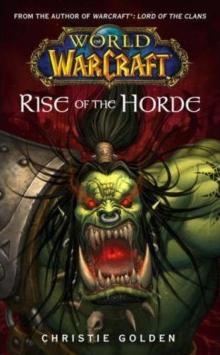 Rise of the Horde
Rise of the Horde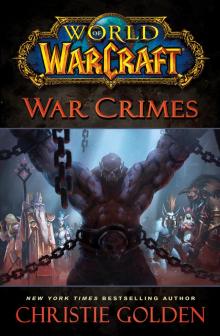 World of Warcraft: War Crimes
World of Warcraft: War Crimes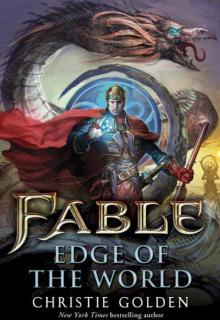 Fable: Edge of the World
Fable: Edge of the World Homecoming
Homecoming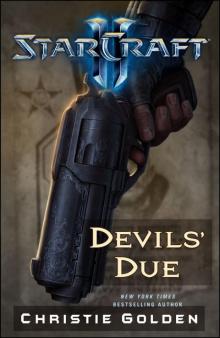 StarCraft II: Devil's Due
StarCraft II: Devil's Due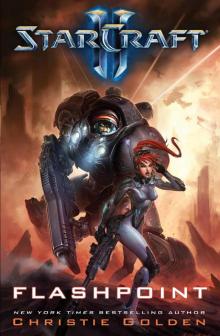 Starcraft II: Flashpoint
Starcraft II: Flashpoint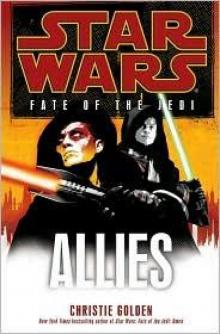 Allies
Allies Shadow Hunters
Shadow Hunters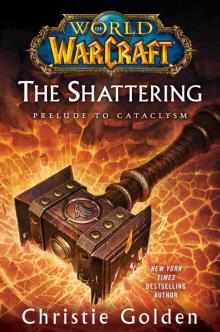 The Shattering: Prelude to Cataclysm wowct-1
The Shattering: Prelude to Cataclysm wowct-1 STAR TREK: VOY - Homecoming, Book Two - The Farther Shore
STAR TREK: VOY - Homecoming, Book Two - The Farther Shore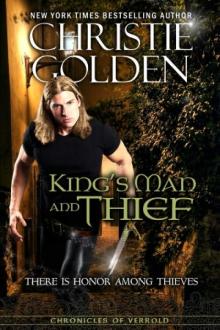 King's Man and Thief
King's Man and Thief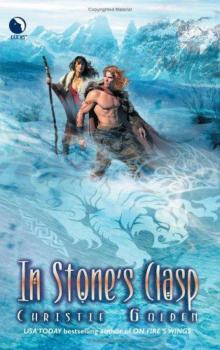 In Stone's Clasp
In Stone's Clasp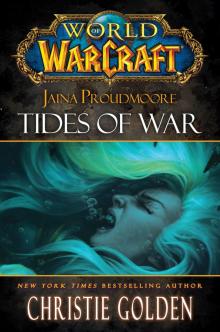 Jaina Proudmoore: Tides of War
Jaina Proudmoore: Tides of War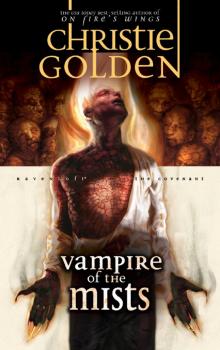 Vampire of the Mists
Vampire of the Mists Star Wars: Fate of the Jedi II: Omen
Star Wars: Fate of the Jedi II: Omen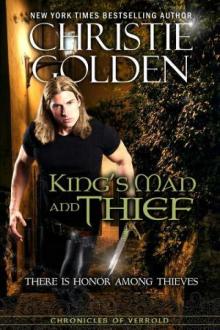 King's man and thief cov-2
King's man and thief cov-2 Star Trek
Star Trek StarCraft: Dark Templar: Twilight
StarCraft: Dark Templar: Twilight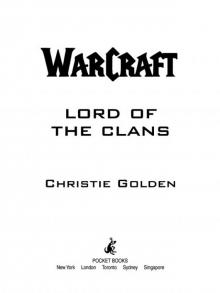 Lord Of The Clans
Lord Of The Clans ARKTIKA.1 (Short Story)
ARKTIKA.1 (Short Story)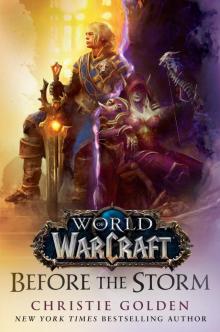 Before the Storm
Before the Storm STAR TREK: VOY - Homecoming, Book One
STAR TREK: VOY - Homecoming, Book One Shadow of Heaven
Shadow of Heaven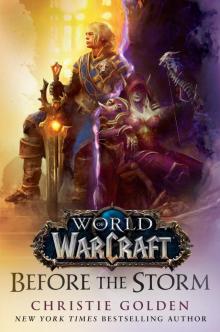 Before the Storm (World of Warcraft)
Before the Storm (World of Warcraft)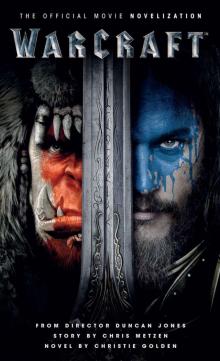 Warcraft Official Movie Novelization
Warcraft Official Movie Novelization Flashpoint
Flashpoint STAR TREK: The Original Series - The Last Roundup
STAR TREK: The Original Series - The Last Roundup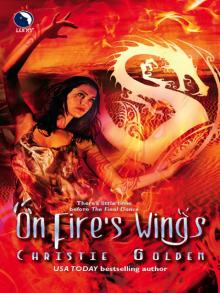 On Fire’s Wings
On Fire’s Wings Spirit Walk, Book One
Spirit Walk, Book One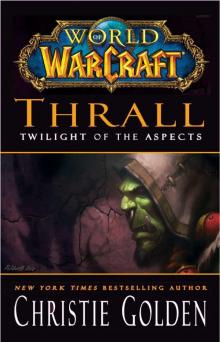 Thrall Twilight of the Aspects
Thrall Twilight of the Aspects Valerian and the City of a Thousand Planets
Valerian and the City of a Thousand Planets Warcraft
Warcraft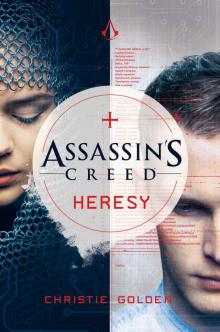 Assassin's Creed: Heresy
Assassin's Creed: Heresy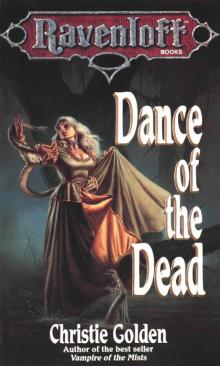 Dance of the Dead
Dance of the Dead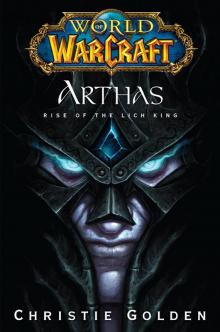 Arthas: Rise of the Lich King wow-6
Arthas: Rise of the Lich King wow-6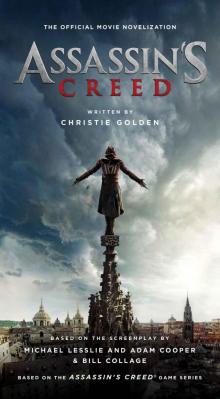 Assassin's Creed: The Official Movie Novelization
Assassin's Creed: The Official Movie Novelization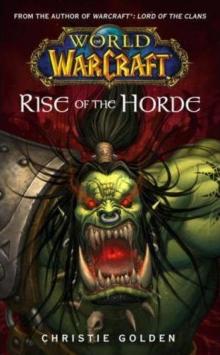 Rise of the Horde wow-2
Rise of the Horde wow-2 Dark Disciple
Dark Disciple Ghost Dance
Ghost Dance The Shattering
The Shattering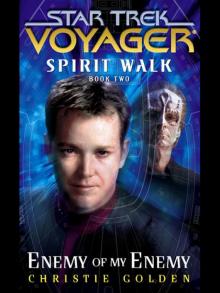 Spirit Walk, Book Two
Spirit Walk, Book Two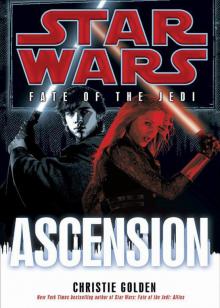 Star Wars: Fate of the Jedi: Ascension
Star Wars: Fate of the Jedi: Ascension Star Wars: Fate of the Jedi V: Allies
Star Wars: Fate of the Jedi V: Allies The Enemy Within
The Enemy Within Kindred Spirits
Kindred Spirits The Farther Shore
The Farther Shore Star Trek: Hard Crash (Star Trek: Starfleet Corps of Engineers Book 3)
Star Trek: Hard Crash (Star Trek: Starfleet Corps of Engineers Book 3) Twilight
Twilight